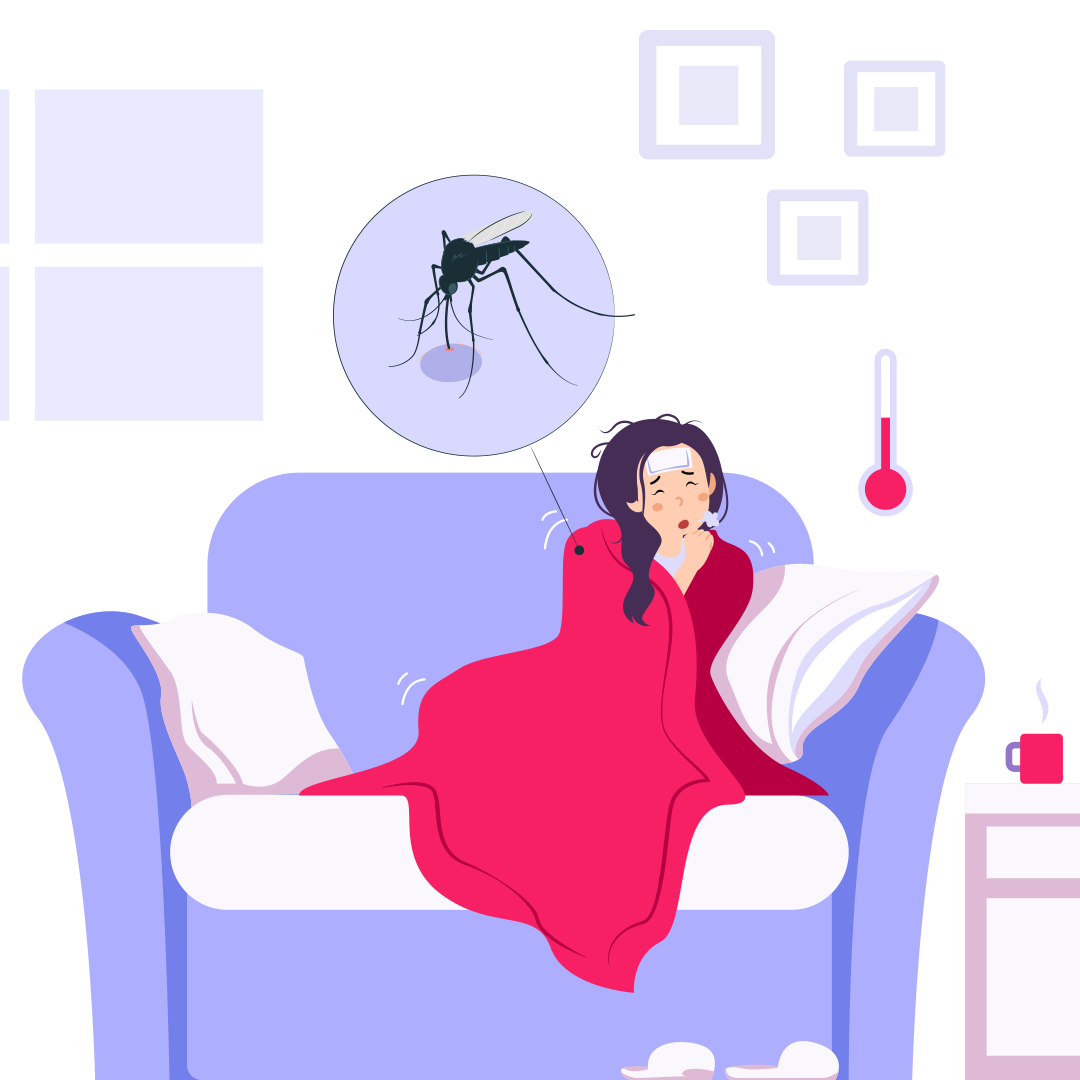Understanding Dengue Fever: Symptoms, Causes, and Prevention Tips

Dengue Fever Symptoms and Prevention: A Complete Guide
Monsoon is one of the most anticipated seasons; however, it also brings a rise in infectious diseases. Mosquito-borne infections such as malaria and dengue pose a significant health risk in this period.
Dengue fever is a viral infection that spreads through the bite of an infected mosquito, meaning it does not spread through contact (person-to-person).
With no specific cure available, it is crucial to take preventive measures against this disease, especially in dengue-prone areas. This article will discuss the various symptoms of dengue fever, its causes, and preventive measures to help keep you safe.
What are the Symptoms of Dengue Fever?
Most people infected by Dengue start experiencing symptoms within 4-10 days of being infected. These symptoms are usually mild and similar to a regular flu.
The most characteristic symptom of dengue fever is a sudden, high fever (104F or above). Other symptoms include:
- Headache
- Pain behind eyes
- Pain in joints and muscles
- Nausea or vomiting
- Swelling in glands
- Rashes
In mild cases, most patients recover within a week. If the case is severe, however, there may be a risk of sudden worsening of symptoms. This typically occurs after a couple of days of fever and results in severe dengue, dengue hemorrhagic fever or dengue shock syndrome. Severe dengue symptoms include:
- Pain in abdomen
- Persistent vomiting (with or without blood)
- Blood from the nose
- Bleeding gums
- Blood in your urine or stools
- Superficial bruising
- Difficulty breathing
- Fatigue
- Irritability or restlessness
Severe dengue can cause internal bleeding and is a medical emergency. Immediate treatment for dengue is necessary if you experience any of these symptoms.
Dengue Fever and Monsoon Season
Dengue fever spreads through Aedes mosquito bites, often seen in and around human dwellings. These mosquitoes become dengue virus carriers after biting an infected person. The carrier mosquitoes then spread the infection to others through their bites.
Monsoons can bring heavy rains, which can cause water to accumulate. The stagnant water collected in crevices, containers, puddles and flower pots provides the perfect breeding ground for these mosquitoes. The mosquito larvae can thrive and multiply rapidly in these abundant breeding sites. With a rise in the mosquito population, the risk of dengue fever transmission also heightens.
The surge in mosquito population during the monsoon can lead to dengue outbreaks due to the increased chances of mosquito bites. This subsequently increases the likelihood of virus transmission. With more people getting dengue fever, the disease can spread rapidly and become a public health risk. Preventive measures can prove to be a boon in such situations.
Tips to Prevent Dengue Fever
Since dengue fever is a viral infection, it has no specific cure. The most efficient means of preventing dengue fever infection is through measures to avoid mosquito bites and mosquito population control.
How can you avoid mosquito bites?
- Use mosquito-repellant creams or patches when outdoors.
- Wear light-coloured clothes as they attract fewer mosquitoes.
- Cover as much of your skin as possible with long-sleeved clothes and pants.
- Avoid being outdoors early in the morning or the evening as these are the times mosquitoes are most active.
How to eliminate standing water?
- Check and empty containers (buckets, flower pots, and old tyres) that can potentially collect rainwater.
- Cover water containers with fitted lids.
- Ensure proper drainage by cleaning the gutters.
- Regularly drain water from coolers.
During the monsoon season, you should be extra vigilant. Inspect the drainage areas where water accumulates frequently. Drains and gutters should be free from blockages as they may prevent the flow of rainwater. By proactively cleaning the surroundings, you can create a safer environment and significantly decrease the risk of dengue fever.
Research for dengue fever vaccines is ongoing, with some vaccines available in the market for areas prone to dengue fever infection. While these dengue fever vaccines are effective, they are inadequate by themselves. Prevention is better than cure, so keep your surroundings clean and free of mosquito breeding sites.
Conclusion
Understanding dengue fever symptoms is essential for prompt diagnosis and treatment, reducing complications. Preventive measures to avoid mosquito bites and controlling mosquito populations are the best strategy against dengue fever. Monsoon season requires special care as the risk of dengue infections increases substantially.
If you are in search of a trusted and reputable physician for your treatment, Bharosa.life, is here to help! Bharosa.life is a patient experience platform that offers genuine and verified reviews from patients. Find the medical resources that suit your requirements by exploring the platform today!
